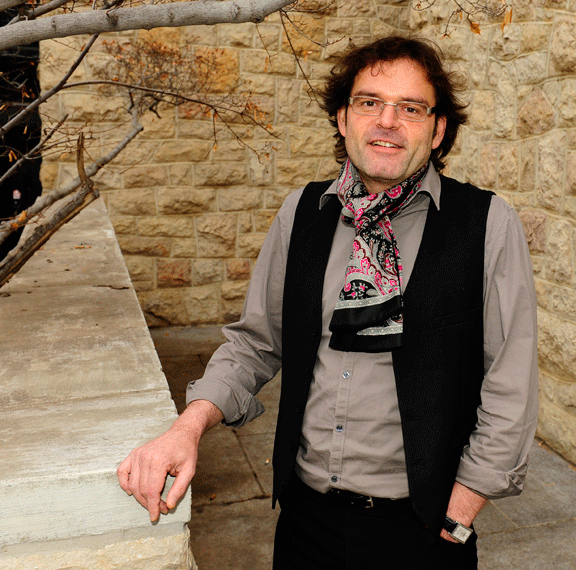Thomas Rotter tracking Lean initiatives in health care
Can the principles from Lean, a system developed to build cars, be adapted to cut health-care costs, decrease wait times and move innovations more quickly from the lab to the bedside? It’s a question health regions across Saskatchewan are trying to answer, and one that Thomas Rotter is watching closely.
By Michael Robin "To my knowledge, this is the biggest experiment world-wide in terms of implementing a quality improvement philosophy or approach like Lean," said Rotter, who holds the U of S research Chair in Health Quality Improvement Science, the first of its kind in Canada. "There are many approaches, not only Lean, but Lean is very progressive with a very broad focus."
"To my knowledge, this is the biggest experiment world-wide in terms of implementing a quality improvement philosophy or approach like Lean," said Rotter, who holds the U of S research Chair in Health Quality Improvement Science, the first of its kind in Canada. "There are many approaches, not only Lean, but Lean is very progressive with a very broad focus."
According to the Saskatchewan Ministry of Health, there were more than 200 Lean projects underway in the province as of 2012. More than 1,000 projects are planned for the next four years, with about 10,000 – a quarter of the province's health-sector workforce – to be trained in Lean processes.
Lean management philo-sophy has its roots in the Toyota Management System. Some of its central tenets are increased efficiency, decreased waste and using research to decide what matters rather than accepting pre-existing ideas. Rotter said this is a key challenge.
"Research shows it takes 17 years to transfer the available evidence from research to the bedside, to the patient," he said. "That's unacceptable. That's far too long."
One of Rotter's aspirations is to do the research to see if the Saskatchewan experiment is working. He is pursuing a proposal to the provincial Ministry of Health to evaluate the Lean initiative.
Rotter explained that while there are intriguing case studies, there are little hard data on how – or if – processes like Lean contribute to health quality improvement. This is critical to get buy in from health professionals, something he has experienced first hand working as an acute care and mental health nurse in Germany. This beginning coloured his outlook.
"I'm a very careful and skeptical person because of my background in nursing," he said. "I know what goes on, on a hospital ward and in an operating theatre. It's hard to tell me stories."
After 10 years on the ward, a back injury made his hands-on career impossible. He worked in hospital administration and later in public health before going back to school to complete a PhD with a focus on health quality improvement. He moved to Rotterdam, Netherlands, to pursue his research career.
At the University of Maastricht, Rotter gained a reputation for his work, for example, by helping two major hospitals – one in the Netherlands and one in Germany – co-ordinate efforts to improve health-care delivery. While only 30 kilometres apart, this co-operation had to bridge two systems, two languages, and an international border.
When the U of S, Saskatchewan's Health Quality Council and the Saskatchewan Health Research Foundation teamed up to create a research chair, Rotter applied for the job. He took on his new duties at the U of S in September 2012.
Part of Rotter's mission is to get people talking to each other. This has meant many face-to-face meetings among various health colleges and units on campus as well as with leaders in the province's health regions. The idea is to get people thinking of themselves as part of larger teams.
"Team work has huge implications in terms of the quality of care provided," Rotter said. "The better a health-care team works, the better the outcomes are."
Another challenge is to try to get health quality improvement specialists around the world speaking the same language. Rotter cites research that identified 84 different terms to describe the "clinical pathway" concept. They all mean the same thing: to move a patient efficiently and effectively through the system, in a set amount of time. For example, a person coming in for a hip replacement should expect the same steps for diagnosis, treatment, and follow-up care in a similar amount of time.
Rotter explained that a common lexicon would help standardize care "(but) it's a bit more complicated in the field of health care because we are humans, not cars. We do vary."
Rotter is optimistic that many of the concepts embodied in Lean and similar systems can be adapted to improve health care.
"My mandate is to bring variation in the field of health care down to an acceptable level. The question of how we improve health care is how do we bring down variation?"

